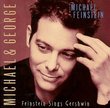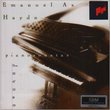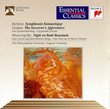| All Artists: Artur Schnabel, Beethoven Title: Artur Schnabel: Beethoven (Great Pianists of the 20th Century) Members Wishing: 1 Total Copies: 0 Label: Philips Release Date: 2/9/1999 Genre: Classical Styles: Chamber Music, Forms & Genres, Concertos, Sonatas, Historical Periods, Classical (c.1770-1830), Modern, 20th, & 21st Century, Instruments, Keyboard Number of Discs: 2 SwapaCD Credits: 2 UPC: 028945696126 |
Search - Artur Schnabel, Beethoven :: Artur Schnabel: Beethoven (Great Pianists of the 20th Century)
 | Artur Schnabel, Beethoven Artur Schnabel: Beethoven (Great Pianists of the 20th Century) Genre: Classical
To many, Artur Schnabel made Beethoven famous (and vice versa). Between 1932 and 1935, he recorded the first complete cycle of Beethoven's piano sonatas, a collection that--even after decades of new interpreters--still st... more » |
Larger Image |
CD DetailsSynopsis
Amazon.com To many, Artur Schnabel made Beethoven famous (and vice versa). Between 1932 and 1935, he recorded the first complete cycle of Beethoven's piano sonatas, a collection that--even after decades of new interpreters--still stands the test of time. While this double-CD anthology of Schnabel's Beethoven, in Philips's Great Pianists series, only focuses on three of the sonatas, the collection chosen is a true testament to the pianist's insight into the composer. On the Waldstein Sonata, Schnabel transitions from a furious-paced Allegro con brio to a snail's-paced Introduzione without ever sounding ponderous. The 1933 recording of Concerto No. 4 with the London Philharmonic Orchestra reveals the pianist's lighter side: the finale ends in a delicate, yet playful, fashion. The Diabelli Variations from a few years later follows a similar, equally delightful form. Included are two previously unreleased-to-CD recordings from 1942: Schnabel's accounts of Beethoven's late Piano Sonatas Opp. 109 and 111. Though not a far departure from his earlier recordings, they're a fascinating document: No. 111 sounds truly menacing. Though Schnabel's style wasn't faultless, the emotional depth he brought to these works has rightfully made him a legend. --Jason Verlinde Similar CDsSimilarly Requested CDs
|
CD ReviewsThough not novel, quite satisfying jlipton@Impath.com | New York, NY | 03/16/1999 (5 out of 5 stars) "This pair of CDs is most important for bringing back to general circulation Schnabel's 1942 US recordings of Beethoven's 30th and 32d sonatas. Though not dramatically different from those recorded 10 years earlier, the sound is marginally clearer, and Phillips has done a good job in remastering without imposing excessive filtering or noise reduction. The same is true of the famous recording of the Diabelli variations, never reissued by EMI on CD, but available on Pearl in a slightly noiser (though perhaps minimally more present) transfer. The concerto performance is transcendent, and should be heard by all who love this music. I call on EMI (perhaps on their Testament label) to reissue Beethoven's bagatelles and Mozart piano concertos #s 20 & 24.Jeffrey F. Lipton" This is what meeting God sounds like!!! jlipton@Impath.com | 01/23/2004 (5 out of 5 stars) "Schnabels Beethoven Opus 111 is one of the greatest examples of the recorded piano repertoire of the 20th Century. I am so glad Phillips reintroduced this 1942 recording in the catalog. The recording wasn't immediately released in 1942 due to the shortage of shellac due to wartime constraints. As a result, RCA had lost the plates for many years in their vaults. It appeared briefly on RCA's budget "Victrola" series on vinal back in the '70's. I have both Schnabels, both Serkin, Solomon, Richter, Horszowski, Kempff, Brendel, and probably one that I'm forgetting. No one plays with as much of a feeling of the sublime as did Schnabel. This is a truly great recording." Zen and the Art of Playing Beethoven Softly Jeffrey K. Lurie | Cleveland OH USA | 10/08/2001 (4 out of 5 stars) "Artur Schnabel, to me, is one of those legendary music figures from days gone by who I have been afraid to listen to for fear that less than acceptable recorded sound would diminish my ability to appreciate the music. On this collection, my fears was mostly alleviated: the sound is acceptable in all but the fastest passages. In those passages, I found the music to sound cluttered and indistinct. On the quieter passages of the late sonatas and the Diabelli Variations, the music is heavenly. Anyone who thinks that Beethoven is merely loud, anguished playing is in for a real education here. I can see why Schnabel felt that this was Beethoven the way he was meant to be played."
|

 Track Listings (37) - Disc #1
Track Listings (37) - Disc #1
![Vivaldi's Ring of Mystery [With CD]](https://nationalbookswap.com/cd//m/30/0730/80730.jpg)







